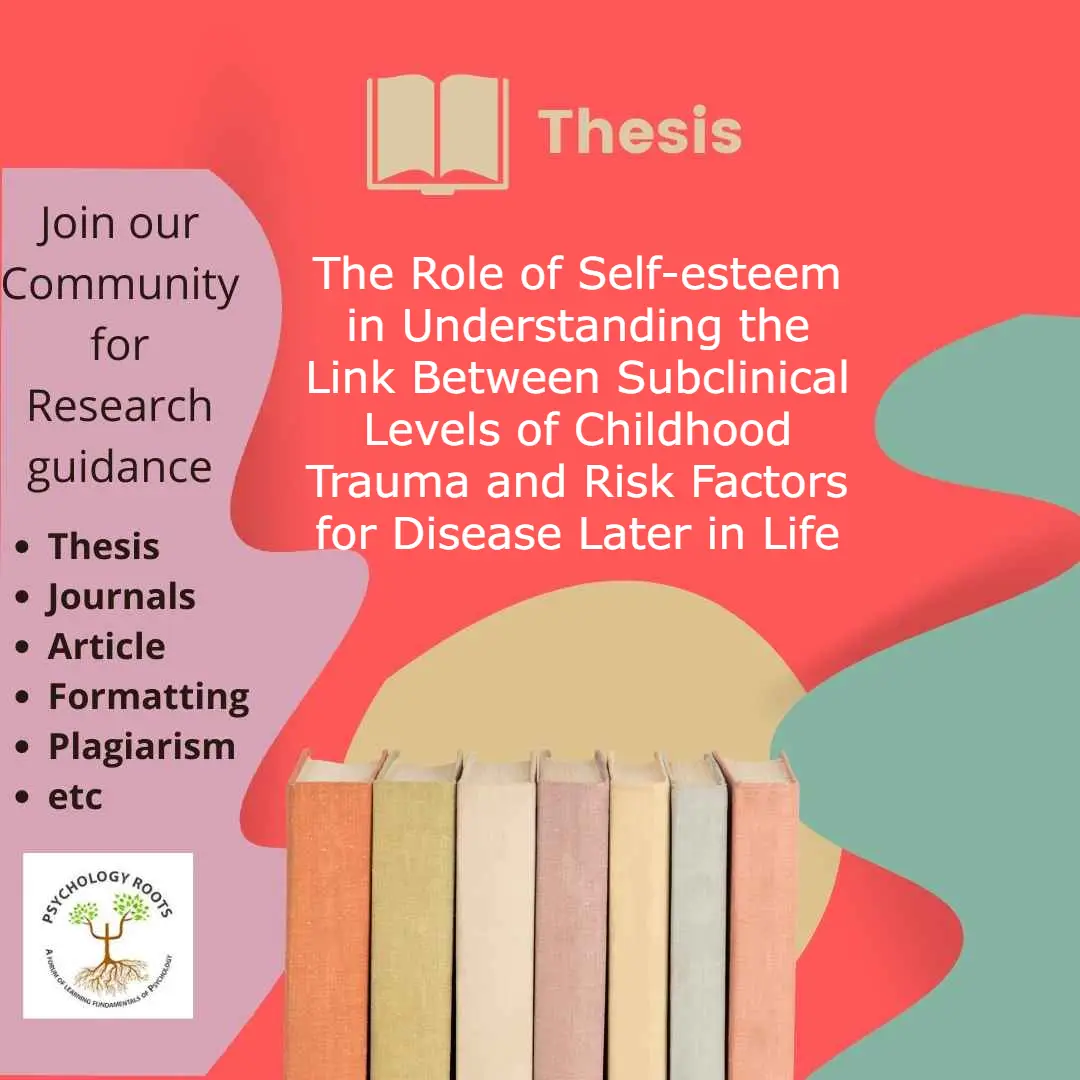Table of Contents
The Role of Self-esteem in Understanding the Link Between Subclinical Levels of Childhood Trauma and Risk Factors for Disease Later in Life
Here in this post, we are sharing the full Psychology thesis on “The Role of Self-esteem in Understanding the Link Between Subclinical Levels of Childhood Trauma and Risk Factors for Disease Later in Life“. You can read the abstract of the thesis with a download link. We have thousands of thesis in our collection (See articles). You can demand us any article related to psychology through our community, and we will provide you within a short time. Keep visiting Psychology Roots.
Abstract of the thesis
Current literature proposes a relationship between retroactive reports of childhood trauma and the cortisol response to acute psychosocial stress in delineating the pathways that may lead to future health problems. Less is known about sub-clinical levels of trauma and possible mediators of this relationship. A sample of healthy adults (mean BMI =23.5 kg/m2), of both genders (female N=12, male N=15) with a mean age of 21.8 years (SD=4.6) provided self-ratings of childhood experiences using the Childhood Trauma Questionnaire (CTQ). Participants also completed the Rosenberg Self-esteem Scale to assess global self-esteem. All participants were exposed to the Trier Social Stress Test on two consecutive days to elicit an acute stress response. Saliva samples for assessment of cortisol were taken repeatedly before and after each stressor.

The Role of Self-esteem in Understanding the Link Between Subclinical Levels of Childhood Trauma and Risk Factors for Disease Later in Life
Mean CTQ total scores were in the low range (M=7.3, SD=2.0). Higher childhood trauma scores predicted higher cortisol responses (β = .53, t(25) = 3.13, p = 0.004), and lower self-esteem scores (β = -0.55, t(25) = -3.26, p =0.003), and lower self-esteem scores predicted higher cortisol responses (β = -0.71, t(25) = -5.10, p <0.001), upon a second exposure to stress only. Self-esteem fully mediated the relationship between childhood trauma scores and the cortisol stress response to the second stress exposure, reducing it to non-significant (β = 0.20, t(22) = 1.10, p = 0.29), contrary to other personality measures tested, demonstrating its full mediation properties.
In summary, the results indicate that even sub-clinical levels of childhood trauma can have a negative effect on stress response systems; trauma need not be in the severe range to exert a powerful effect on these systems, particularly for repeated stress exposure. Although these effects may be rather benign in the short term, over time, they may lead to risk factors for several diseases. The mediating effects of self-esteem may help inform therapies that are geared towards helping those who have experienced subclinical levels of childhood trauma by including a self-esteem enhancing component.
Researcher of the Thesis
- Juliette Saltz
Avail Thesis [sociallocker id=64051]
[/sociallocker]
Need help in Research:
Are you struggling in research? Don’t Worry, We provide you with complete guidance and support free and quickly. Just need to create a query in our community. We also offer paid services such as:
- Thesis writing
- Article writing
- Statistical analysis
- Reference according to APA
- APA Formatting
- Supervisions
- Courses and Training
Contact us for the best quality free and paid services. info@psychologyroots.com or (+92-3336800644)
Information:
The purpose of our website is only to help students to assist them in finding the best suitable instrument for their research especially in Pakistan where students waste a lot of time in search of the instruments. It is totally free of cost and only for creating awareness and assisting students and researchers for good research. Moreover, it is necessary for you to take the permission of scales from their representative authors before use because copyrights are reserved by the respected authors.
Help Us Improve This Article
Did you find an inaccuracy? We work hard to provide accurate and scientifically reliable information. If you have found an error of any kind, please let us know.
Add comment. we appropriate your effort.
If you have any scale or any material related to psychology kindly share it with us at psychologyroots@gmail.com. We help others on behalf of you.
Follow